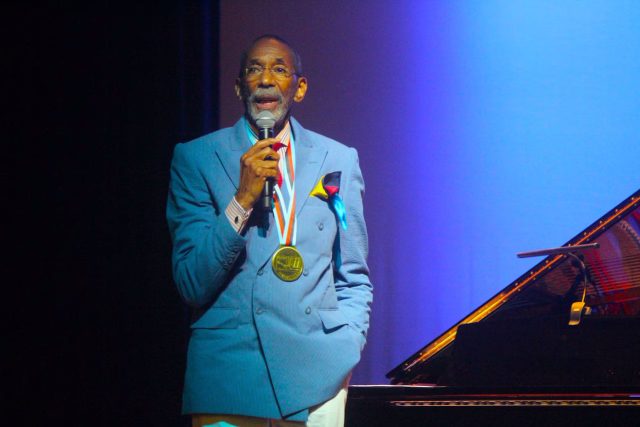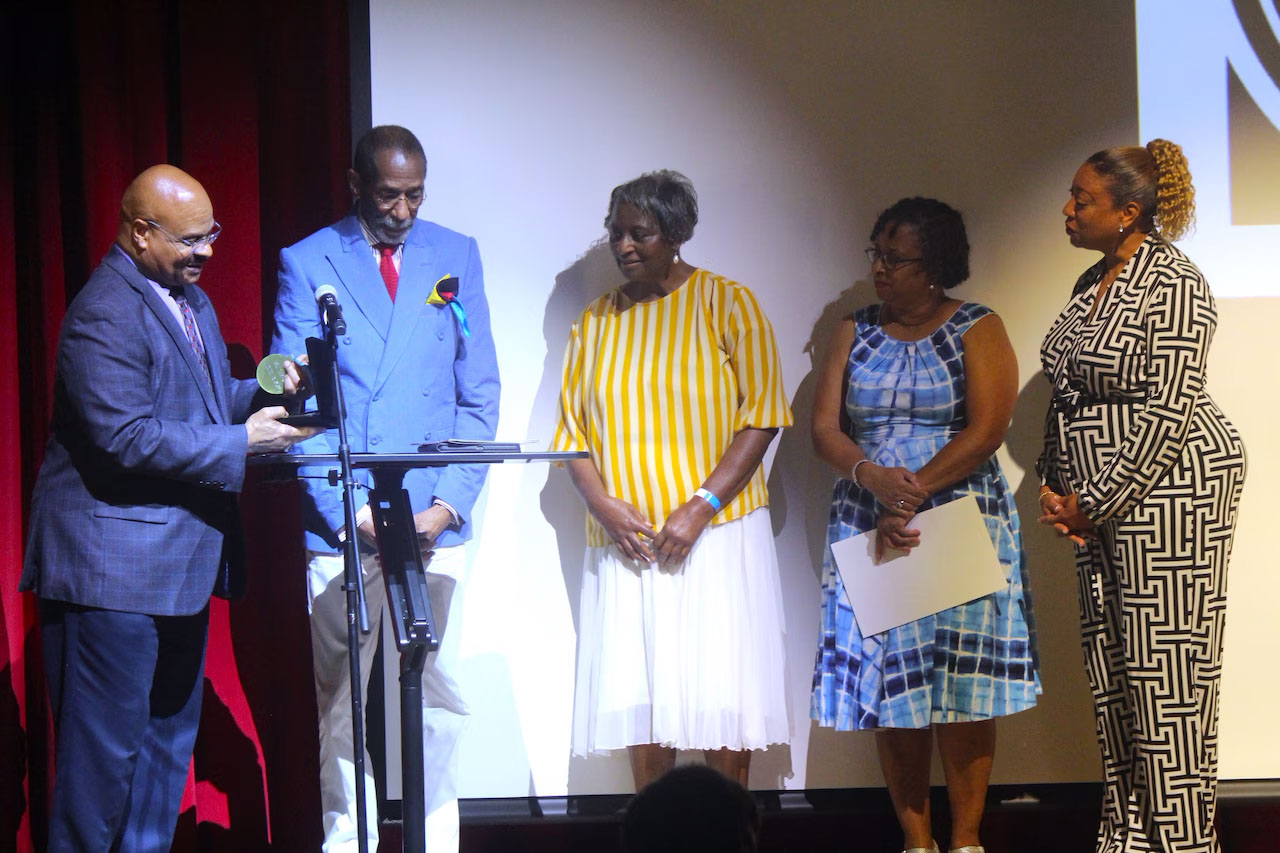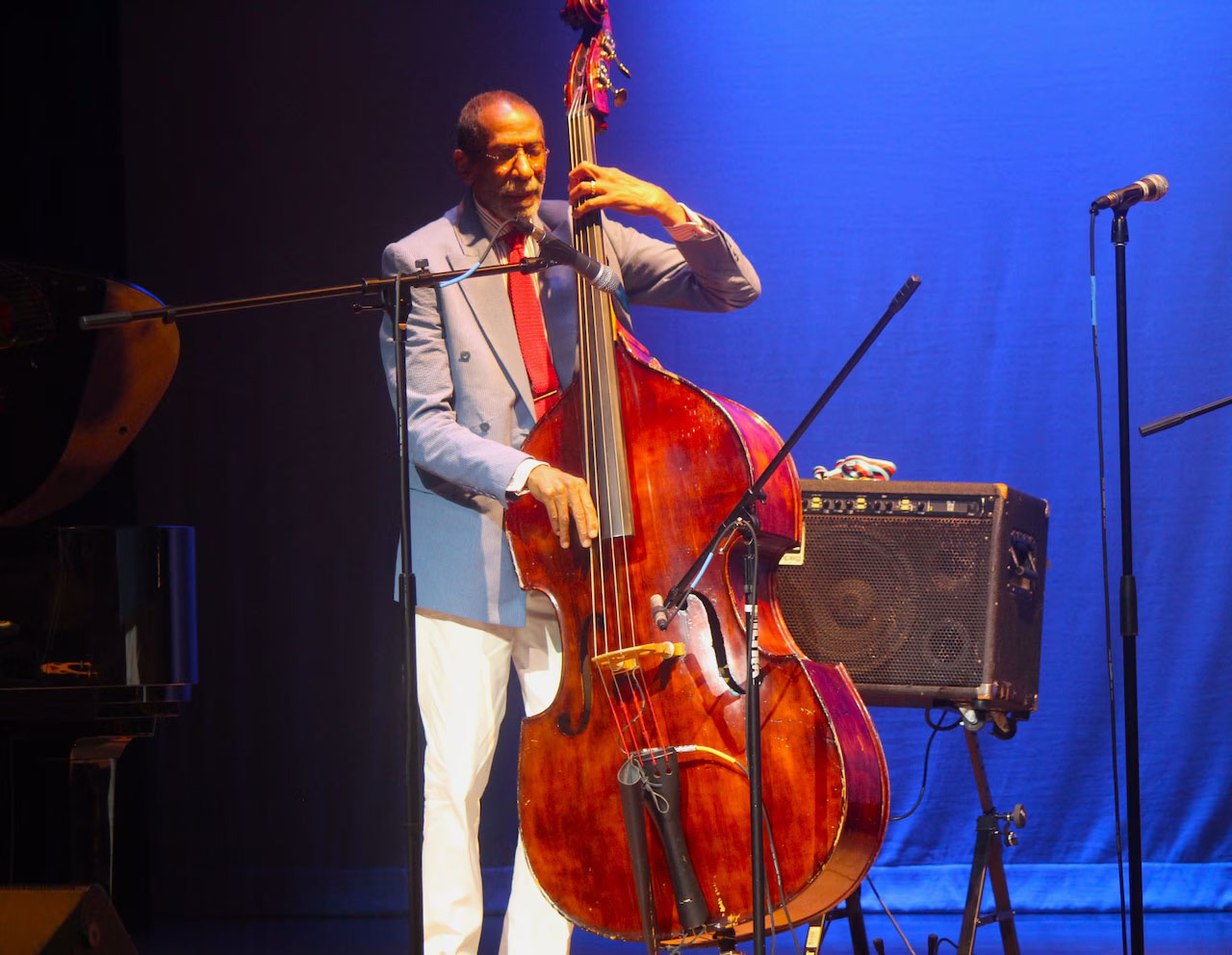
By Shauna Stuart | sstuart@al.com
Ron Carter, the world’s most recorded jazz bassist, is now part of the Alabama Jazz Hall of Fame.
Carter was inducted into the hall of fame during an Aug. 3 ceremony at the historic Carver Theatre in Birmingham. The program, dubbed “A Cool Jazz Afternoon” was also a grand reopening party for the Alabama Jazz Hall of Fame headquarters.
The Carver Theatre, which houses the Alabama Jazz Hall of Fame, closed for renovations in 2017. While the Carver Theatre’s lobby and performance hall reopened in 2022, the Alabama Jazz Hall of Fame’s museum and the Jazz Hall Radio studio remained closed for upgrades and new installations.
The Alabama Jazz Hall of Fame museum will officially reopen for visitors on Aug. 6.
Carter, popularly known as Mr. Carter or Maestro Carter, is one of jazz’s most acclaimed and influential bassists. From 1963 to 1968, he was a member of Miles Davis’s Second Great Quintet with Wayne Shorter, Herbie Hancock, and Tony Williams.
After leaving the quintet, Carter embarked on an extensive freelance career, playing with jazz luminaries from Lena Horn and Dexter Gordon to Cannonball Adderly and Gil Scott-Heron.
Recorded With Greats
Over the years, he expanded his work into different musical genres, recording with greats such as Roberta Flack, Billy Joel, Paul Simon, Bette Midler, and Aretha Franklin. In the 90s, Carter added hip hop to his roster when the rapper Q-Tip of a Tribe Called Quest requested he play on the group’s second studio album “The Low End Theory.” In addition to winning three Grammy awards, Carter has played on over 2,500 individual albums, garnering a Guinness World Record as the most recorded bassist in history.
Carter is a Michigan native, but he has roots in Alabama. Earlier this summer, he announced the Jazz Hall of Fame honor on social media, explaining his connection to the state. His mother, Willie Carter, was born in Lee County and grew up near Birmingham.
On Saturday, more than 100 people, including jazz enthusiasts, educators, musicians, and community leaders from around the state gathered inside of the Carver Theatre’s performance hall for Carter’s induction.
Bishop Jim Lowe — the son of Alabama Jazz Hall of Fame founder J.L. Lowe and the president of the board of directors — led the award presentation. Before his address, he asked three politicians to join him on stage: State Rep. Mary Moore; Jefferson County Commissioner Lashunda Scales; and Birmingham City Council member Carole Clarke, who comes from a celebrated Birmingham jazz family. Together, the group presented Carter with an engraved medal and a resolution from the Alabama State Senate.
”It is my honor to give this to you. For Ron Carter, from Alabama Jazz Hall of Fame. This is something we could not do if it had not been for the state, the city, and the county. We recognize this great musician, this great man who contributed so much to jazz,” said Lowe, as the performance hall erupted into applause.

Carter, who beamed with pride from behind the podium, thanked the audience but kept his remarks brief.
“I may come back later and say a little more. But just a little!” Carter said as the audience laughed.
Following the presentation, a band comprised of Gary Motley on piano, Sherman Irby on saxophone, Rodney Whitaker on bass, Ben Johnson on drums, Collins “Bo” Berry on trumpet, and vocalist Veronica Swift performed a tribute concert. The set included arrangements and compositions by Carter, including the ballad “Candlelight.” The concert concluded with the song “Stars Fell on Alabama.”
Medalist
After the concert, Carter returned to the stage to give a brief speech.
“They’re having the Olympics in Paris. There must be 465 contestants. And the people who win the medals always get pictures. And so, this picture is dedicated to all the gold medal winners!” said Carter. Channeling the victorious spirit of Olympic athletes, he bit his medal as photographers in the room snapped pictures.
“This is mine!” said Carter, raising the medal in the air. Then, he lowered his hands and smiled. “I’ll take a turn on that now,” he said, pointing to the bass.
He played for about 20 minutes. After the performance, Carter waited to meet people in the audience. Friendly and social, he shook hands, took pictures with attendees, and autographed programs with a gold metallic Sharpie. As the event wound down, he headed upstairs to the museum for a final round of photos with the Jazz Hall of Fame staff.
“Pulled It Off”
Carter’s induction into the Alabama Jazz Hall of Fame is the culmination of a year-long process, said Orville Ifill, vice president of the Alabama Jazz Hall of Fame board of directors.
The idea sprung from a talk with retired Jefferson County Circuit Judge Houston Brown, Hasan Shahid, the son of Birmingham-born jazz legend Amos Gordon, and Dr. Eugene Cain, a Birmingham native and retired deputy superintendent of the Michigan Education Department.
While gathered at Brown’s house, Ifill told the group he was looking for a new inductee to the Jazz Hall of Fame. He was hoping to find a name people would recognize, someone who could help bring a spotlight to the nonprofit.
That was when Cain mentioned Ron Carter.
“I said what? The Ron Carter? And Eugene said ‘Yeah, his mother is from Alabama. And he comes to my place and plays every year,’” said Ifill.
The men told Ifill they could help him get in contact with Carter. One afternoon, Carter called when Ifill was having a video meeting with the Hall of Fame board on Zoom. Ifill immediately left to answer the phone. When he returned to the meeting, he had good news.
“I said ‘Guys, I just talked to Mr. Ron Carter. And he’s willing to be inducted into the Jazz Hall of Fame.’ And they went quiet,” said Ifill. “That’s how we got him. And he and I communicated from that point on.”
He later met Carter when the musician made a trip to Huntsville to perform for an event with the Tennesse Valley Jazz Society. The pair continued the conversation about the induction. And even though renovations kept delaying the opening of the Jazz Hall of Fame, Carter remained interested.
“I finally said ‘Ron. We’re going to open in another year or two. Give me a date and we’ll work around your date,’” said Ifill. “And we finally pulled it off.”

“Being in Birmingham”
The Jazz Hall of Fame booked a full schedule for Carter. The day before the induction, Carter spent time on Friday meeting Birmingham jazz musicians and educators. The trip marked the longest he’d spent in Alabama in years.
“I’ve had some great grits. I’ve had a lot of hot sun. And I’ve met a lot of wonderful people,” Carter told AL.com. “Being in Birmingham for this long is just amazing to me.”
Carter said he is looking forward to coming back to Alabama. Not only to network, but also to explore his ancestry. He’s working with historians to trace his family lineage. And it turns out, it wasn’t just his mother who has ties to Alabama. His father’s side of the family does too.
“ It’s hard to follow my tree. But someone is doing that. One thing they found was my roots in this area. My father was from Terre Haute, Indiana. And his grandfather was from Birmingham, who [later] moved to Terre Haute, Indiana.”
Carter said he enjoyed seeing the Jazz Hall of Fame museum (“It’s stunning!”), but he’s still learning about Birmingham’s extensive jazz history.
Upstairs in the Jazz Hall of Fame museum, Carter and Lowe chatted about jazz icons the city has birthed.
“There’s Erskine Hawkins, Fess Whatley. Sammy Lowe. My dad was one. He founded the organization,” said Lowe.
“I’d heard the names,” replied Carter. “But I’d never heard them play live because they were all before my time.”
Lowe grew up surrounded by noted musicians. He sat at the piano with Duke Ellington when he was a young boy. His family had a close relationship with saxophonist Reuben Phillips and trumpeter Cootie Williams– two bandleaders Carter knew well.
Fitting Induction
All in all, Carter’s induction into the Alabama Jazz Hall of Fame is fitting. Founded in 1978, one of the organization’s missions is to preserve jazz through education. In 1999, the Jazz Hall of Fame started giving free Saturday morning lessons to students in grades K-12.
For Dr. Leah Tucker, the Jazz Hall of Fame’s executive director, memories of the education programs have been a guiding force during the years of renovations. One day, she found herself looking at folders filled with hundreds of registration forms from students who had taken classes over the years.
“When I started looking through all the different books, there were hundreds and hundreds of names of students we have educated,” said Tucker. “So I know that jazz will not just fade into the past.”
Efforts like that please Carter, who is also a renowned educator. And in Birmingham, he was glad to meet a group of musicians who are just as happy to instruct as they are to perform.
“I think without people like that to spread the word, jazz is going to have a hard time,” said Carter. “My job is to keep playing and keep teaching.”




